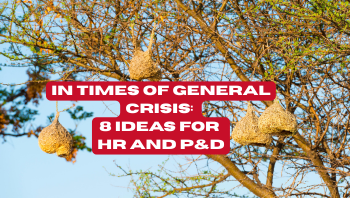The choice is yours! Strengthening psychological safety: 8 ideas for HR initiatives
Uncertain times leave their mark – on companies, too. Rising anxiety, stress and insecurity are no longer a marginal phenomenon, but a real problem that affects work performance and corporate culture. But as a manager or HR professional, you can actively counteract this.
This article offers you eight measures that can be implemented immediately to promote psychological safety, strengthen team resilience and provide targeted support for employees. Which initiative is right for your organization?
Why companies must take responsibility now
The global situation, the situation in the U.S., the arms build-up in Europe as a result of the war of aggression in Ukraine, and the tense situation in the German economy are concerning many people: Insecurity and even fear are becoming more common, and short- or long-term stress symptoms are more the rule than the exception.
The fact is that prolonged insecurity can have a severe impact on mental health . It can also lead to significant performance issues in the company.
If the above-mentioned areas want to take responsibility for the emotional support of their employees, measures in this regard could often be justified with reference to existing corporate cultural values.
Eight effective measures for more psychological safety
In principle, a whole range of possible formats are available for dealing with and supporting mental health. Here is a selection of 8 quickly implementable options:
Workshop: “Talking openly about fears – gaining confidence together”
Link to Workshop-Guide: Talking openly...
Total duration: approx. 2.5 hours
Participants: ideally 6–15 people
Objectives:
• To openly identify, express and acknowledge fears
• To listen to each other and develop understanding
• Finding encouragement and confidence and strengthening them together; not feeling alone
World Affairs Dialogue Café
Format: Regular, informal discussion groups (e.g. once a week or every two weeks), low-threshold approach that focuses on community and emotional expression.
Contents:
- Clear rules for respectful communication (active listening, no blaming, focus on one's own feelings and experiences).
- Optional: Keynote speeches or articles on relevant topics (e.g. fake news, source criticism, dealing with conflicts).
- No solution finding or political debate, but pure exchange and support.
Mindfulness and resilience workshop
Offer workshops that focus on mindfulness practice and resilience building. These workshops can teach techniques for coping with stress, emotional regulation, and methods for increasing personal resilience in uncertain times. Implementation: by internal and external thematic professionals.
Buddy system for psychological support
Develop a buddy system in which employees are assigned to each other as support partners. These relationships are designed to foster regular and confidential exchanges where concerns can be discussed and coping mechanisms developed together. The mutual aim would be to experience social support, not a substitute for therapy.
Storytelling events
Organize events where team members share personal stories and experiences related to the current world situation. These events can help to foster empathy, strengthen team cohesion, make diverse perspectives visible and promote understanding. Particularly suitable for interculturally diverse groups.
Community Impact Projects
Organizing cross-team social projects that strengthen the sense of agency. Teams could work together to support local initiatives or develop their own projects that make a positive contribution. This gives employees a sense of actively making a difference rather than being passively at the mercy of world events. A combination of team building, social engagement, and skills development.
Live chat with psychologists
Limited to 15-minute slots for initial counseling
Perspective Breakfast with Experts
Monthly breakfast events with external experts (historians, journalists, psychologists) who explain and contextualize the background to current events. The format combines knowledge transfer with informal exchange and helps to reduce anxiety through better understanding.
Conclusion: Which initiative is right for your company?
Psychological safety is not a “soft” benefit, but a critical success factor for companies. Employees who feel understood, valued and supported are more resilient, productive and engaged. Especially in uncertain times, it is the role of HR, managers and People & Culture teams to actively counteract this and offer targeted support.
The measures presented here show that there is no universal solution – but many effective approaches that can be adapted to corporate culture, existing values and individual needs. Whether it's a workshop, a dialog format or resilience training, the signal it sends is more important than the specific measure. Companies that take responsibility for the mental well-being of their employees are not only investing in their workforce, but also in a stable, sustainable organization.
Call4Action:
Which initiative is right for your company? Make a conscious decision to take a first step – the impact can be greater than you think.
And perhaps this is a new consideration and idea for possible measures for your company, but extraordinary times call for extraordinary approaches.


About me

All Rights Reserved
Get in touch
-
+49-(0)941 600 93 003
-
This email address is being protected from spambots. You need JavaScript enabled to view it. -
Thomas_Huber
ToChange Gmbh
-
Thomas Huber
-
Traubengasse 6
-
D-93059 Regensburg

